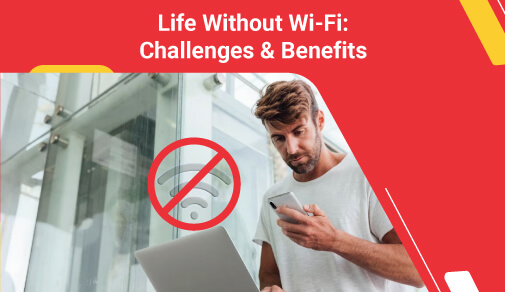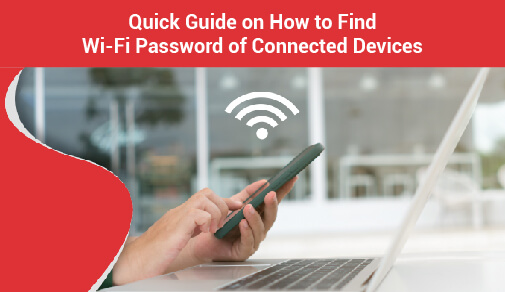Life without WiFi
-
0
-
-
7 minutes

The year 2020 (and the subsequent ones) witnessed an unprecedented global pandemic (COVID-19) that forced the world to change overnight. As we embraced remote work, online education, and virtual interactions, one thing became abundantly clear: the indispensable role of Wi-Fi in our lives.
This blog delves into what life would be like without Wi-Fi — Wi-Fi And The New Normal, especially after the pandemic, exploring the challenges, adjustments, and potential effects on various aspects of people's daily routines.
As we navigate through a post-pandemic world, it is essential to envision a future where Wi-Fi continues to shape our lives while being aware of its impact on human society and mankind's dependence on it.
Wi-Fi Dependency and the Pandemic
To imagine what life without Wi-Fi would be like, we must first understand Wi-Fi dependency post-pandemic. In the wake of the pandemic, the internet and Wi-Fi took centre stage in people's personal as well as professional lives. The pandemic amplified the human race's reliance on Wi-Fi like never before.
Working from home (WFH) became the norm, so much so that even today, most of us are still WFH. We have become so used to remote work (and enjoying its associated luxuries) that most of us cannot fathom the thought of going back to offices. As per research, about 97% of people would like to continue with remote work for the rest of their careers.
Wi-Fi has enabled professionals to stay connected to their colleagues, clients, and projects. Online meetings, video conferences, and collaborative tools allowed businesses to function remotely.
Additionally, students depended on Wi-Fi to attend virtual classes, submit assignments, and access educational resources. Social interactions also moved online, with video calls and virtual gatherings bridging the gap created by physical distancing.
Entertainment became accessible, and so did connecting with loved ones over video calls. Several other aspects of people's day-to-day lives, like shopping and banking, and other financial services, moved online as well. The pandemic highlighted the indispensability of Wi-Fi as a lifeline to the outside world during challenging times.
Adjusting to Life Without Wi-Fi
While it is hard to imagine adjusting to life without Wi-Fi, let's look at a few practical scenarios that would play out if the world suddenly went offline:
Wi-Fi And The Future Of Remote Work
The absence of Wi-Fi would dramatically impact people's daily routines. Remote work, which has become a vital component of the new normal, would be severely hampered. One of the biggest challenges without Wi-Fi will be the inability to access emails, project management tools, and online resources. This would hinder productivity and communication.
Moreover, people will have to travel to their workplaces and socialize in person, leading to an overload of stress. This will also lead to wastage of time, money, and resources. In the process, it could slow down the process of economic revival and suppress innovation.
The Downfall of the EdTech Industry
One of the major benefactors of the pandemic has been the EdTech industry. With Wi-Fi as its cornerstone, this sector has empowered students to continue their education online without any disruption. It has also enabled innovative methods of teaching, like virtual classrooms.
In the absence of Wi-Fi, EdTech would be rendered obsolete overnight. The conventional methods of teaching, like physical tutoring and a classroom setting, will have to be revived. This could lead to an overall drop in the quality of education, as well as inhibit the progress of research.
Students would struggle to complete assignments, participate in virtual classes, and conduct research without the vast information available online. Students would have to go back to physical classrooms but with limited availability of resources, such as textbooks and learning materials. Information will no longer be available at their fingertips.
Rethinking Leisure
Streaming services boomed during this pandemic as people began to spend more time at home. Be it movies, music, or gaming, streaming services have become a part of our daily lives. Moreover, people have begun spending more time on social media, making it an integral part of our lives.
In the absence of Wi-Fi, these leisure activities would also undergo a significant transformation. Streaming services, online gaming, and social media platforms, which have become integral to our entertainment and leisure time, would no longer be accessible. We would need to rediscover offline hobbies, engage in physical activities, and seek entertainment in more traditional forms such as books, board games, or outdoor pursuits.
No More Instant Connections
Nowadays, if one is missing someone, it's easy just to pick up the phone and get on a video call with them. Similarly, video calls have made life much easier for professional use, such as business meetings, doctor's appointments, and even university classes.
But in a life without Wi-Fi, communicating with distant family and friends would be much more difficult. We could still use traditional modes of communication like letters and phone calls, but they would be more time-consuming and expensive.
Long-distance relationships could become even harder to manage without being able to stay in touch on a regular basis. Similarly, businesses might have to resort to more expensive, slower methods of communication, such as snail mail and face-to-face meetings, which could lead to a decline in productivity.
Reliance on Physical Infrastructure
Living without Wi-Fi would necessitate a greater reliance on physical infrastructure such as landline phones, postal mail, and printed materials. This could result in increased costs, longer response times, and potential disruptions in communication channels.
Moreover, relying on physical infrastructure could also lead to limited access for people living in rural areas or other places with poor internet connectivity. These individuals would be at a disadvantage when it comes to accessing information, education, and other services available online.
The Death of Delivery Services
Doorstep delivery of food, groceries, and other items witnessed rapid growth and became a regular part of life for many people after the pandemic. For instance, the food delivery market saw a healthy growth of eight per cent. This was made possible by apps like Deliveroo, Uber Eats, and Just Eat, which allowed customers to order food online without ever having to leave their homes.
Without Wi-Fi, this convenience would no longer be available. Restaurants and other businesses that depend on online ordering would be forced to scale back operations or shut down entirely in some cases.
Customers who rely on delivery services for their groceries and other items would have to revert to traditional methods of shopping, like visiting brick-and-mortar stores. All this will significantly reduce the efficiency of businesses and lead to an overall decline in economic output.
These are just a few of the changes that could come about if Wi-Fi were to vanish. People's lives would be drastically different, and their day-to-day routines would be altered in ways that we cannot even imagine. Adjusting to life without Wi-Fi will be extremely difficult!
Living Offline Without Wi-Fi: Is There a Positive Side?
Despite the challenges, the effects of Wi-Fi absence after the pandemic could also be positive in certain areas. Some of the bright points of life without Wi-Fi could include the following:
·It would encourage face-to-face interactions, promoting stronger personal connections and reducing the distractions caused by constant connectivity.
·People would have more time for introspection, self-reflection, and pursuing offline passions.
·Additionally, it would stimulate the development of alternative technologies and innovative solutions to bridge the gaps created by the absence of Wi-Fi.
·People's data privacy and security would be improved since they wouldn't be constantly exposed to online threats.
·Wi-Fi and the digital world often inundate us with constant notifications, distractions, and information overload. Living offline allows us to disconnect from the virtual noise and practice mindfulness.
·Living offline without Wi-Fi encourages deep work, uninterrupted concentration, and increased productivity in areas that do not require online connectivity.
·Living offline allows us to reduce screen time, minimize exposure to electromagnetic fields, and prioritize our overall well-being.
·Lastly, living offline without Wi-Fi provides an opportunity for a digital detox. This intentional break from technology can lead to improved mental health, reduced stress levels, and a renewed sense of balance in our lives.
Conclusion
Wi-Fi has become an integral part of our lives, enabling us to stay connected, informed, and entertained, particularly during the pandemic. The absence of Wi-Fi would present numerous challenges, impacting remote work, education, communication, entertainment, and many others.
Given the level of Wi-Fi dependency in our lives post-pandemic, it is impossible to imagine a life without Wi-Fi.
Despite this, living offline has its own set of advantages. These include fostering stronger personal connections and driving innovation in alternative technologies. As we navigate a post-pandemic world, it is crucial to recognize both the benefits and challenges of Wi-Fi dependency while embracing its potential to shape the future of the human race.
Maintaining a balance between connectedness and disconnection and using Wi-Fi and the internet responsibly is essential. Visit ACT website to avail WiFi services.







